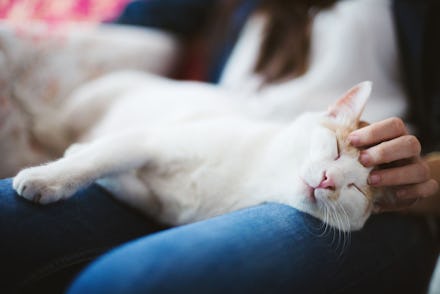Cats bond with their owners like children bond with their parents, study finds

As a self-identified dog person, I’m guilty of buying into the stereotype that cats are selfish, aloof assholes. But new research suggests I may have judged them too harshly. In a study published in the journal Current Biology on Sept. 23, cats seemed to bond with their owners much like children do with their parents.
In the paper, Oregon State University researchers pointed out that more studies exist on social cognition in dogs than in cats, even if cats have long thrived in human environments and, like dogs, can be found living in groups. “Despite fewer studies, research suggests we may be underestimating cats’ socio-cognitive abilities,” they wrote.
To investigate this possibility, they conducted a test used to assess attachment styles in dogs and primates with three- to eight-month-old kittens and their owners. Each kitten spent two minutes in a room with their owner, who then left them alone, returning two minutes later.
Using criteria for evaluating attachment in infants and dogs, the researchers sorted 70 kittens into various attachment styles, based on their behavior when they reunited with their owners. Securely attached kittens acted calmer and spent the same amount of time hanging around their owners as they did scoping out the room.
Insecurely attached kittens steered clear of their owners when they returned, acted clingy toward them (for instance, by climbing into their laps and refusing to budge), or showed a combination of both types of behaviors. Overall, 64.3% of the kittens were securely attached, while 35.7% were insecurely attached, about the same percentages seen in kiddos and doggos.
The study also suggests that once a kitten establishes an attachment style, it remains pretty steady over time. Indeed, when the researchers assigned around half of the kittens to participate in a training and socialization intervention with their owners, the percentages of securely and insecurely attached kittens who had undergone the intervention didn’t significantly differ from those who didn’t, pointing to the possibility that temperament and other heritable factors may also play a role in attachment. Consistent with these findings, when they repeated the attachment assessment experiment with 38 adult cats, they saw roughly the same percentages as they did with the kittens.
The study results indicate that “the majority of cats use humans as a source of comfort,” lead author Kristyn Vitale, a researcher at OSU’s Human-Animal Interaction Lab, said in a statement. Cats are social creatures who have just as deep a capacity to form attachments with their caregivers as children and dogs do. Many of us, including me, have probably just misunderstood them this whole time — maybe they’re not assholes, after all.